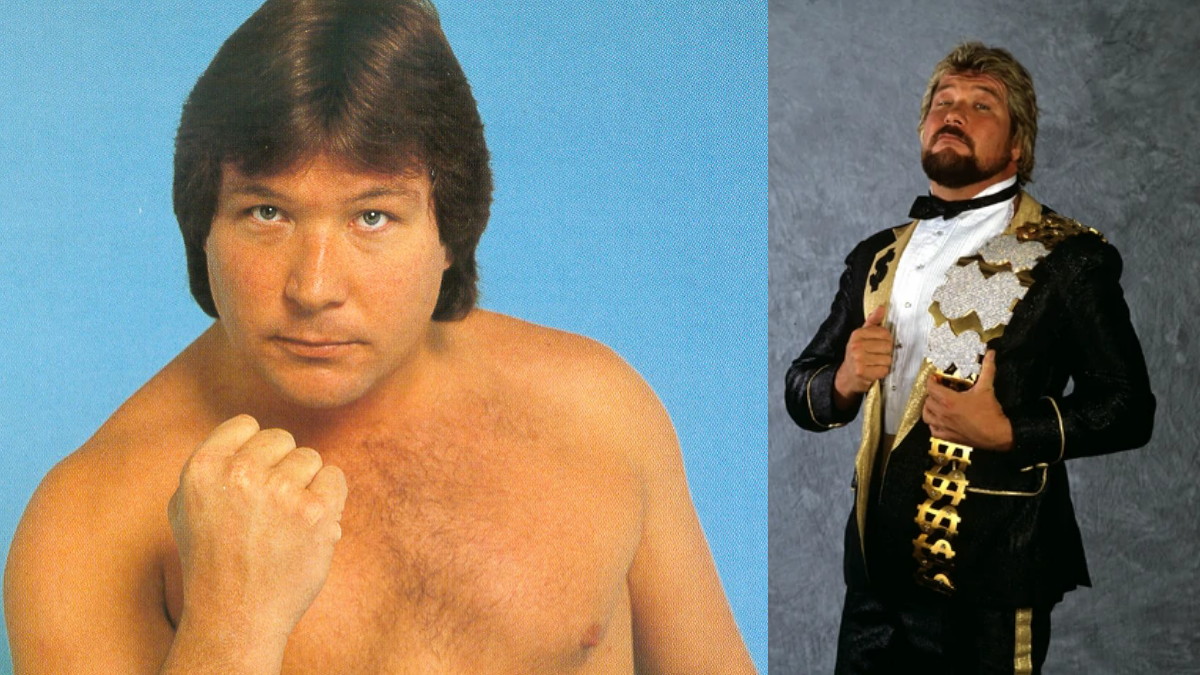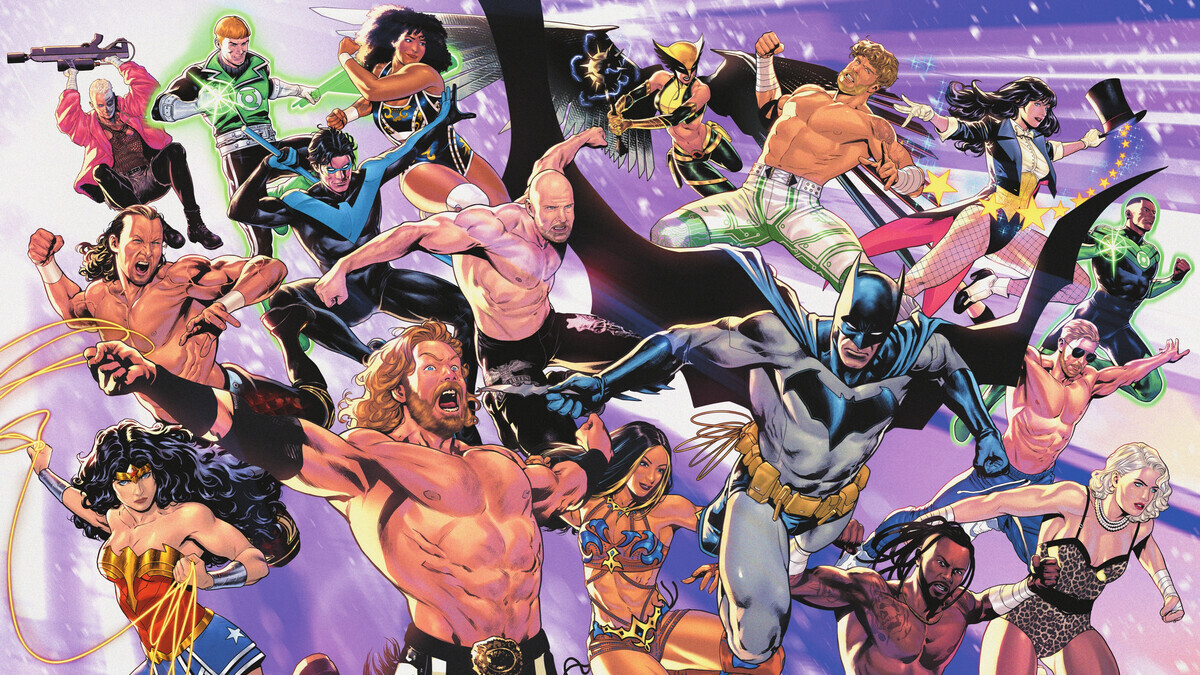A million reasons to be upset at the Ted DiBiase A&E Biography
If there was any doubt that A&E was absolutely, 100% not interested in telling the full story, warts and all, of the WWE wrestlers they have chosen to profile, it was completely confirmed with a ridiculous hagiography of Ted DiBiase Sr. that just ignored so, so much that I am left thinking that I could truly write out a million things that were ignored.
But what’s the point?
The producer/director went into this tale wanting to promote a Christian redemption story, everything else be damned.
Now, it wasn’t dripping in as much religious zealotry as it could have, thank God.
The first quarter of the episode focused on the man born Theodore Marvin Wills, to a professional singer, Ted Wills, and a show dancer, Helen Hild. They divorce when Ted is two, and somehow Helen ends up in wrestling, and marries “Iron” Mike DiBiase when Ted is five.
Two of Ted’s brothers, John and Mike, get brief appearances, but their actual parentage is never explained. I only note this because two of Ted’s sons don’t appear in this episode at all, other than still pictures (more on them later).
Ted idolized Iron Mike and went on wrestling trips with him and the bug was planted.
Then Iron Mike dies of a heart attack in the ring in Lubbock, Texas. Terry Funk showed up with Mike’s wrestling bag, “I remember opening that bag and my dad’s, his wrestling tights were still wet with his sweat and I buried my face in that. I could smell my dad,” recalled Ted of his 15-year-old self.
In one of the many threads that were alluded to but not followed up on, Ted said that his mom started drinking and he prayed for her … and that’s all we learn.
Now living in Willcox, Arizona, Ted becomes a football star, and had a letter of intent at University of Arizona to play there, but by chance, after not seeing wrestling for three years, saw the show taped in Amarillo, Texas, and visits his old friends, the Funks, at a spot show in Tucson.
They invite him to Amarillo to see West Texas State, where he plays on the offensive line (but never graduated), while also learning to wrestle. “I always wanted to be my dad,” he said.
His debut came in 1974, in Lubbock, where his father had died, “and I didn’t even think about it until it was over.” Through his name and the Funks, he was “exposed to so much great talent” and quickly became a major star.
Not that you’d know it from this documentary.
There was a brief WWWF stint in 1979 that gets way more attention than it deserved, simply because he put over future foe Hulk Hogan in Madison Square Garden, and then … he claimed that he was up for the NWA World title, with the board considering him, Dusty Rhodes and Ric Flair to win the belt in 1981.
Since he’s in Georgia, and met his wife, Melanie, there, the tone shifts a little and we learn how they met at a pool, and that Ted signed an autograph for her — she thought he must play for the NFL’s Falcons — which they actually showed on screen. Cute. There was “a really close connection right from the start,” said Melanie. They were married Dec. 31, 1981, with the Junkyard Dog as his best man.
Then it’s off to 1987, when he got the call to join WWF.
So not only was there no explanation where he would have known JYD from, but nothing about their great matches from Mid-South, where he became a true headliner.
Where was all the amazing work from Japan? Not in this love-in, for sure.
Instead, it’s all about the Million Dollar Man, with Bruce Prichard acting as the mouthpiece for Vince McMahon, who is, of course, persona non grata, in these.
Ted took credit for the name after being pitched the idea of a bully who had money: “off the cuff, I said, ‘He sounds like a Million Dollar Man to me.'”
We get various talking heads on the vignettes and the extravagant lifestyle that the character got and portrayed.
No Virgil (Mike Jones) interview, even from the archives? Instead we just get Jimmy Hart shoehorned in, saying, “Virgil was a key to this.”
Fancy life, too many good times, blah blah blah.
Hallmark movie time.
Melanie finds suspicious charges on a credit card bill, and told Ted on the phone not to come home. Ted called that the worst day of his life.
In 1992, Pastor Hal Santos works his magic, the marriage is saved, and Ted finds a better balance between wrestling and marriage.
The bumps add up, Ted retires, does announcing and managing. Leaves the business, does public speaking. WWE Hall of Fame. The grandkids are great.
“Ted has two legacies really, that overlap. Not many people get to say that,” said Melanie. “But he had a career in wrestling that was legend-worthy. The second-half of his life, he’s left a legacy. To me, that’s much more powerful than being a legend in a wrestling ring.”
Happy ending.
Before completing the story, off the top of my head, let’s run through some more things left on the cutting room floor (at least I hope they got some of this on the record for down the road):
- working for Bill Watts in Mid-South
- the Rat Pack
- the black glove gimmick
- teaming with Steve Williams, Stan Hansen in Japan
- what Virgil was like
- the actual turn of Virgil on his boss
- championship runs with IRS (Mike Rotunda) in Money Inc.
- the Million Dollar Corporation
- the how and why of the jump to WCW
- the whole insurance through Lloyd’s of London that kept him well off while not wrestling
- working as an agent in WWE
- his side hustles, like coffee and honey
It wouldn’t be hard to list another million.
But leaving out your sons getting into pro wrestling?
Okay, I can accept Brett DiBiase being on the side, since he really just refereed and never did much wrestling-wise. Mike DiBiase did a little more — and was the one interviewed — and SlamWrestling did a lengthy story on him in 2009: The struggle of the oldest DiBiase son — Mike.
But completely leaving out Ted DiBiase Jr., who went on to great heights in WWE? Mind-boggling.
And I say that knowing full well that both Ted Jr. and Brett are under investigation for taking money meant for needy people in Mississippi and misspending it through what were called “sham contracts” in some of the documents. [NPR has a pretty good explanation of it all.]
Why was that left out? Ted Sr. was understandably brought into the whole mess, since, you know, his most famous gimmick was taking advantage of the less fortunate. And it was his ministry.
They aren’t the same scale-wise, but Sgt. Slaughter’s recent deal where his military record was exposed as non-existent was addressed in his episode, so couldn’t something have been done here?
Oh wait, it would have ruined God’s plan.
RELATED LINKS
- Slam Wrestling’s WWE on A&E archive




